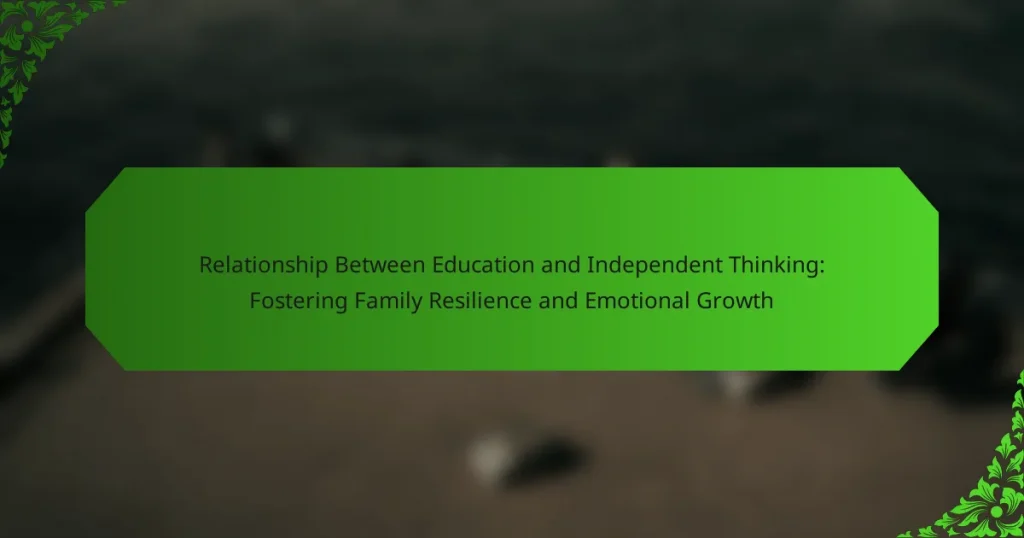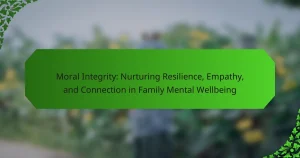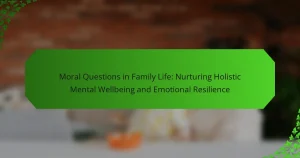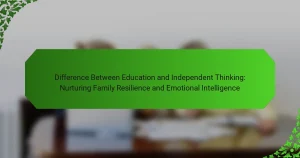Independent thinking is crucial for family resilience and emotional growth. Education enhances critical analysis and problem-solving skills, fostering stronger family bonds. Engaging in educational activities promotes open communication and diverse perspectives. Families can measure progress in independent thinking through observation and discussions, ultimately supporting emotional development.
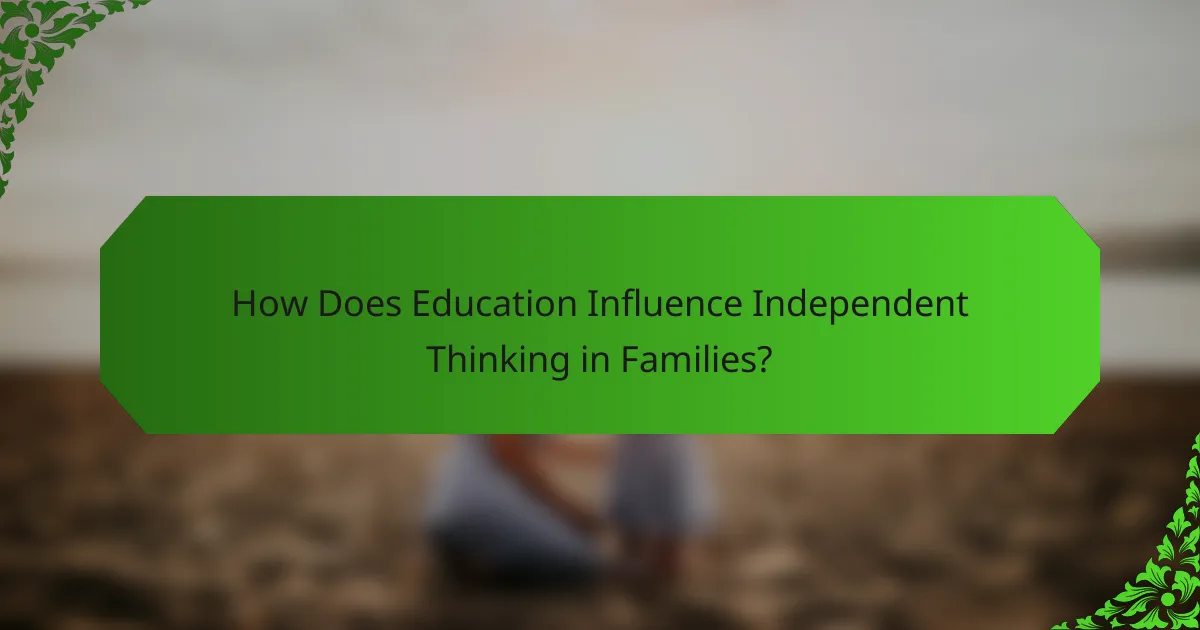
How Does Education Influence Independent Thinking in Families?
Education significantly enhances independent thinking in families by promoting critical analysis and problem-solving skills. This influence fosters resilience and emotional growth, creating a supportive family environment. Research shows that families engaged in educational activities together exhibit improved communication and collaboration, leading to stronger bonds. Children raised in such environments are more likely to develop autonomy and confidence in their decision-making abilities. Additionally, educational experiences encourage diverse perspectives, enriching family discussions and promoting open-mindedness. As a result, the relationship between education and independent thinking serves as a foundation for lifelong learning and adaptability within families.
What are the key components of education that promote independent thinking?
Key components of education that promote independent thinking include critical thinking skills, creativity, problem-solving abilities, and emotional intelligence. These components foster resilience and emotional growth by encouraging students to analyze information, generate original ideas, tackle challenges, and manage their emotions effectively. Cultivating these skills prepares learners to navigate complex situations and make informed decisions.
Why is independent thinking crucial for family resilience?
Independent thinking is crucial for family resilience as it fosters adaptability and problem-solving skills. Families that encourage independent thought can better navigate challenges and support emotional growth. This autonomy promotes open communication, allowing members to express their feelings and opinions. Consequently, families develop stronger bonds and a shared sense of purpose, enhancing their overall resilience.
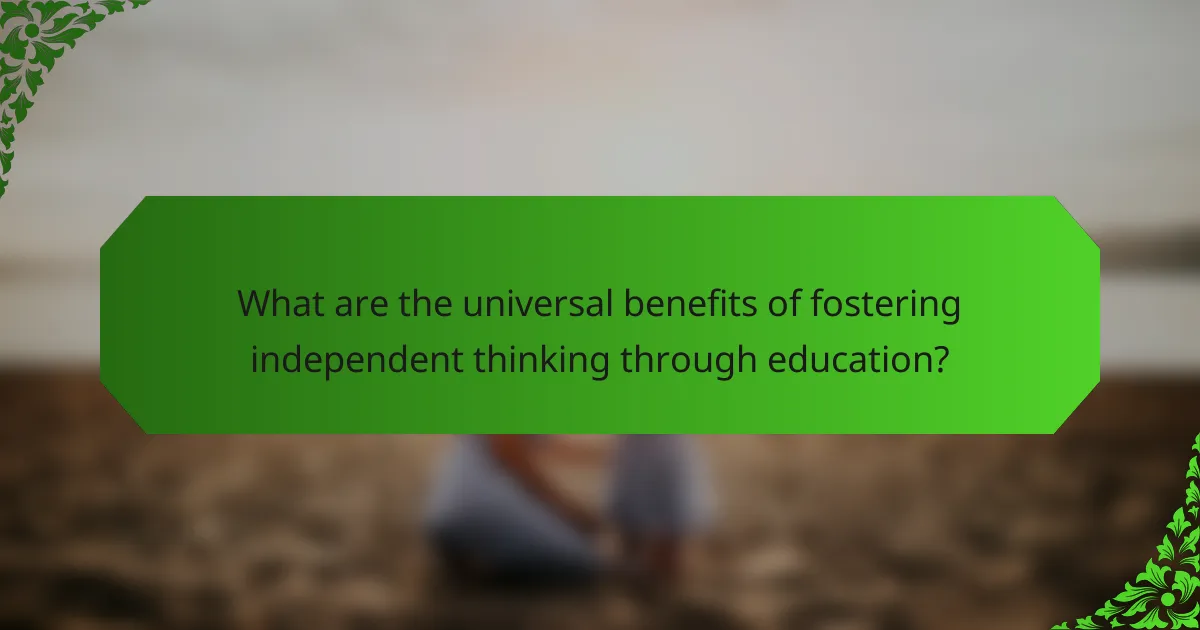
What are the universal benefits of fostering independent thinking through education?
Fostering independent thinking through education enhances problem-solving skills, boosts creativity, and promotes resilience. These benefits contribute to emotional growth and family resilience. Independent thinkers are better equipped to navigate challenges, adapt to change, and engage in critical thinking. Research shows that students who practice independent thinking achieve higher academic performance and develop stronger interpersonal skills.
How does independent thinking enhance emotional growth in children?
Independent thinking significantly enhances emotional growth in children by fostering resilience and self-awareness. It empowers children to make decisions, solve problems, and express their feelings independently. This autonomy nurtures confidence, allowing children to navigate emotional challenges effectively. As they learn to trust their judgment, they develop a deeper understanding of their emotions and those of others, promoting empathy. Engaging in independent thinking also encourages children to confront obstacles, cultivating perseverance and adaptability. Thus, the relationship between education and independent thinking plays a crucial role in building emotional intelligence and resilience in children.
In what ways does education support family dynamics?
Education enhances family dynamics by promoting independent thinking, resilience, and emotional growth. It empowers family members to communicate effectively and solve problems collaboratively. As a result, educated families often exhibit stronger relationships and better coping strategies during challenges. Research indicates that families engaged in educational activities together experience improved emotional well-being and cohesion. Furthermore, education instills values such as empathy and critical thinking, which are essential for nurturing supportive family environments.
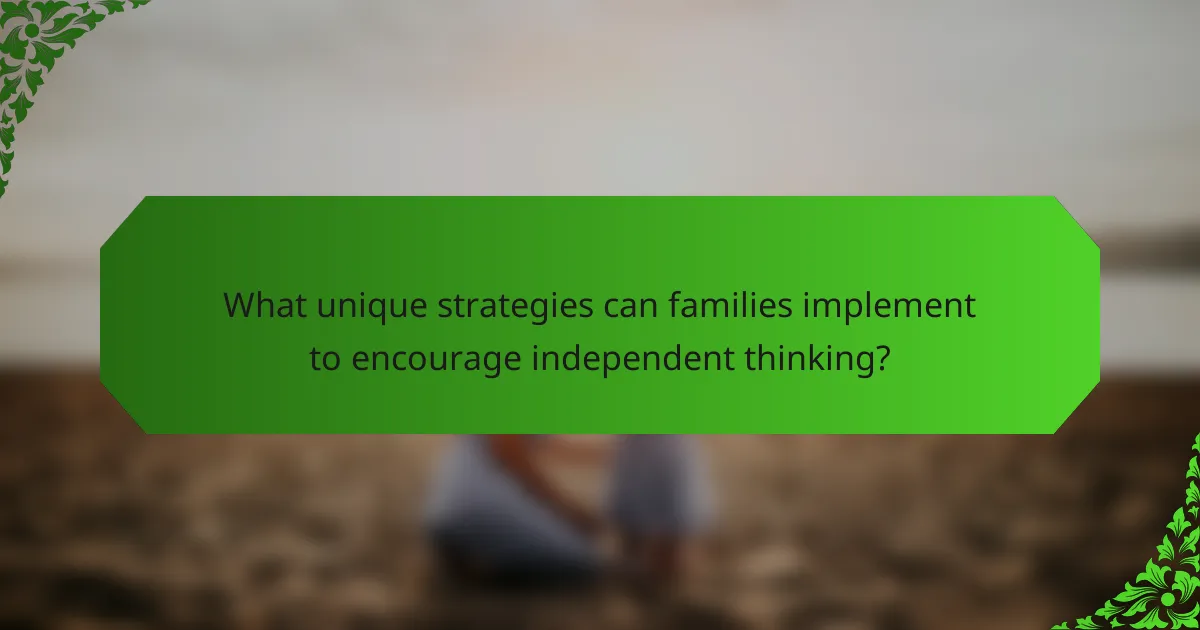
What unique strategies can families implement to encourage independent thinking?
Families can encourage independent thinking by fostering open communication, promoting problem-solving skills, and providing opportunities for self-directed learning. Engaging in discussions about various topics helps children articulate their thoughts and develop critical thinking. Encouraging children to tackle challenges independently builds resilience and confidence. Setting aside time for exploration and creativity nurtures curiosity and innovation.
How can parents model independent thinking for their children?
Parents can model independent thinking by encouraging problem-solving, promoting open discussions, and allowing children to make choices. This approach fosters resilience and emotional growth. Engaging children in conversations about their thoughts helps them articulate ideas and consider different perspectives. Providing opportunities for decision-making enhances their confidence and autonomy. For example, allowing children to plan family activities can teach them responsibility while nurturing their independent thought processes.
What role do extracurricular activities play in fostering independent thought?
Extracurricular activities significantly enhance independent thought by promoting critical thinking and problem-solving skills. Engaging in diverse activities encourages students to explore new perspectives and develop self-reliance. Research indicates that students involved in extracurriculars demonstrate higher levels of creativity and adaptability, key components of independent thinking. Furthermore, these activities foster resilience by providing opportunities to face challenges and learn from failures, ultimately contributing to emotional growth and family resilience.
Which types of activities are most effective?
Engaging in collaborative family activities is most effective for fostering independent thinking. Activities such as open discussions, problem-solving tasks, and creative projects encourage critical thinking and emotional growth. These interactions strengthen family resilience by promoting communication and understanding.

What rare attributes contribute to lasting family resilience through education?
Education fosters family resilience through independent thinking by enhancing critical problem-solving skills, promoting emotional intelligence, and encouraging open communication. Rare attributes contributing to this include the development of adaptive coping mechanisms, the cultivation of a growth mindset, and the ability to navigate diverse perspectives. These attributes empower families to face challenges collaboratively, reinforcing their emotional bonds and resilience over time.
How can storytelling be used as a tool for independent thinking?
Storytelling enhances independent thinking by encouraging critical analysis and personal reflection. It allows individuals to explore diverse perspectives and understand complex emotions. Engaging narratives stimulate imagination, fostering creativity and problem-solving skills. As a result, storytelling serves as a powerful educational tool that promotes resilience and emotional growth within families.
What are the long-term effects of independent thinking on family relationships?
Independent thinking can strengthen family relationships over time by promoting open communication and mutual respect. Families that encourage independent thought foster resilience and emotional growth, leading to healthier dynamics. Research indicates that children who develop critical thinking skills tend to have better conflict resolution abilities, enhancing family cohesion. Moreover, independent thinkers often bring diverse perspectives, enriching family discussions and decision-making processes. This evolution in family interactions nurtures a supportive environment, ultimately resulting in stronger emotional bonds.
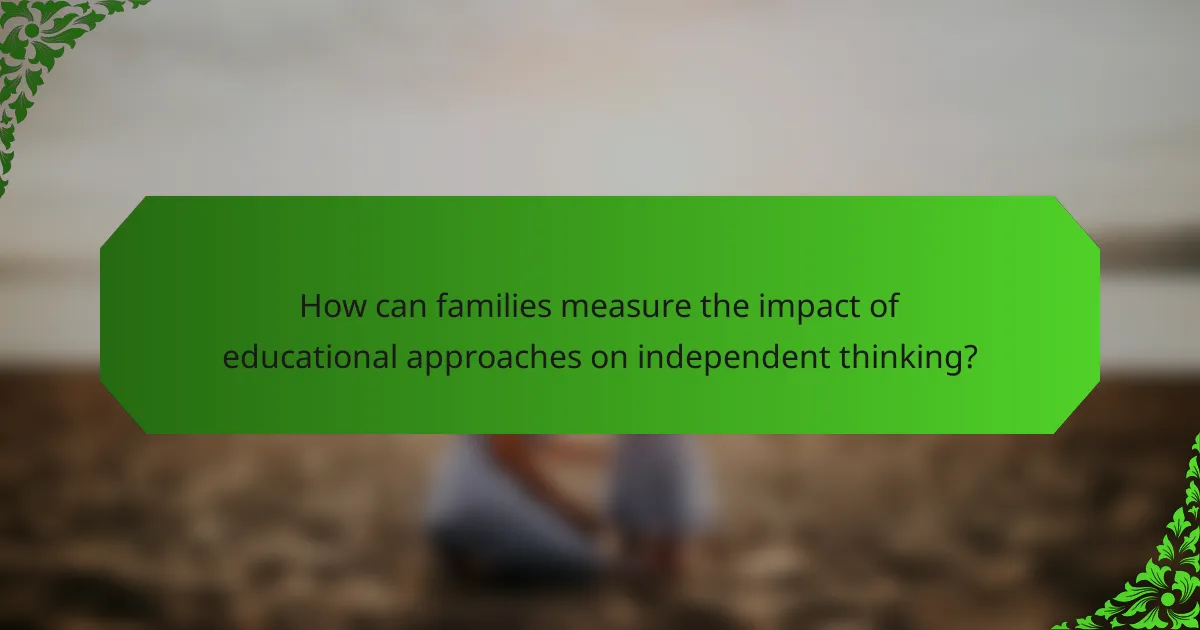
How can families measure the impact of educational approaches on independent thinking?
Families can measure the impact of educational approaches on independent thinking through observation and assessment. Tracking changes in children’s problem-solving skills, decision-making abilities, and creativity provides insights into educational effectiveness. Regular discussions about learning experiences enhance understanding of independent thought development. Utilizing tools like surveys can quantify progress in critical thinking skills.
What tools and resources are available for assessing independent thought?
Educational institutions and family programs provide tools and resources to assess independent thought. These include critical thinking assessments, reflective journals, and family workshops focused on emotional intelligence. Utilizing these resources fosters resilience and emotional growth, enhancing independent thinking in children. Regular feedback and discussions within families also contribute to developing this skill.
What common mistakes do families make in fostering independent thinking?
Families often hinder independent thinking by overprotecting children, providing excessive guidance, and discouraging risk-taking. These mistakes limit creativity and problem-solving skills. Encouraging autonomy and supporting decision-making fosters resilience and emotional growth. Providing opportunities for children to explore and learn from failures is crucial.
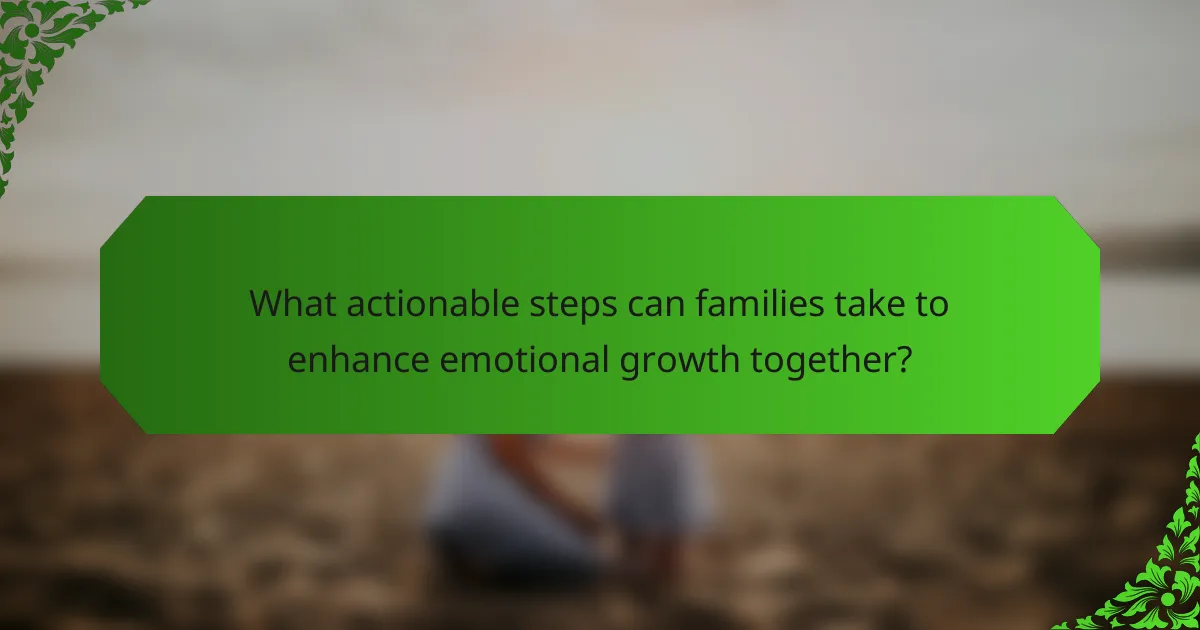
What actionable steps can families take to enhance emotional growth together?
Families can enhance emotional growth together by engaging in open communication, setting shared goals, and participating in collaborative activities. Regular family meetings can foster a safe space for expressing feelings and discussing challenges. Encouraging independent thinking through problem-solving discussions helps build resilience. Practicing gratitude as a family can strengthen emotional bonds and promote a positive outlook. Lastly, exploring new experiences together, such as volunteering or learning a new skill, can deepen connections and support emotional growth.
What best practices should families adopt for holistic mental wellbeing?
Families should adopt practices that prioritize open communication, emotional support, and educational engagement to enhance holistic mental wellbeing. Encouraging independent thinking fosters resilience and emotional growth.
Regular family discussions about feelings and challenges build trust and understanding. Engaging in shared educational activities strengthens bonds and promotes critical thinking. Setting aside dedicated time for family interactions can significantly improve emotional health.
Incorporating mindfulness techniques, such as meditation or deep breathing, can help manage stress. Establishing routines that include physical activity also contributes to overall mental wellness.
Encouraging children to express their thoughts and opinions nurtures self-confidence and independence. This collaborative approach to mental wellbeing creates a supportive environment for all family members.
